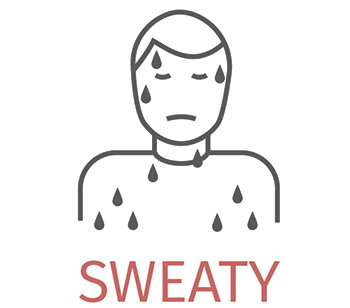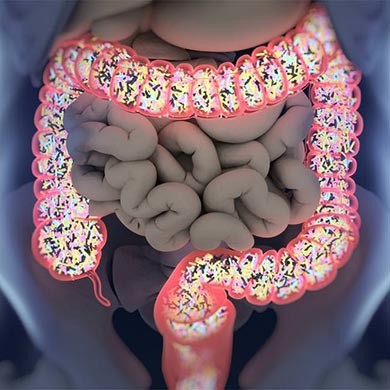What Is Hyperhidrosis?

Sweating is a normal phenomenon and is one of the regular functions of the body. However, hyperhidrosis is a condition that causes excessive sweating where someone sweats so much that the moisture drips from their hands or bodies - unfortunately the condition isn't temporary. Excessive sweating may happen in all parts of the body or only specific parts. Hyperhidrosis may often be a birth condition but in a few cases it begins later in life. Whilst hyperhidrosis isn't a life threatening condition, it can often affect a person’s self-esteem or sap their confidence.
Symptoms Of Hyperhidrosis
Excessive sweating, as the name implies, translates into sweating above normal. Perspiring too much becomes normal for people suffering with a benign disease. However, excessive sweating isn't normal and should be investigated.
Usually the symptoms of hyperhidrosis are excessive sweating on the palms of your hands, armpits, soles of your feet and on your face. Excessive sweating on the face is sometimes associated with intense redness. Usually, hyperhidrosis is more prevalent in a specific area. When this predominance occurs in very visible areas, such as your palms, sufferers may have some difficulties relationships with third parties, through fear, insecurity and shame.
People who suffer from excessive sweating can often face some difficulties throughout the day. One reason for this is because sweating a lot makes social contact difficult; people with hyperhidrosis may avoid a handshake with people, avoid picking up or touching objects, working on the computer and even avoid driving in fear of not being able to control the vehicle because the steering wheel can become slippery.
The clothes of people who sweating a lot also often become stained (especially in the armpit area), their socks remain wet throughout the day, and find it difficult to wear sandals or open shoes because the sweat stains are visible and their feet slip inside the shoes. This is aggravated during times of greater stress and when the temperature is higher.
Types Of Hyperhidrosis
Primary focal hyperhidrosis
Primary focal hyperhidrosis is a common condition typically featuring localised sweating - usually affecting specific areas such as the groin, armpits, head, hands and feet. These symptoms usually occur on both sides of the body at the same time, and studies have suggested that this condition can be hereditary.
Secondary focal hyperhidrosis
Secondary focal hyperhidrosis is slightly less common, with symptoms including excessive sweating across the whole body. If you suffer from excessive sweating at night, this might well be the cause. Secondary general hyperhidrosis is often a symptom of a wider condition such as menopause, diabetes, thyroid problems or due to side effects of certain medication.
This refers to excessive sweating that's a result of an underlying medical condition or the side effects of medicines that can cause the sufferer to often sweat during the night. This type of hyperhidrosis begins during adulthood, is generalised and affects the entire body.
What Causes Hyperhidrosis?
There are a number of potential causes of excessive sweating or hyperhidrosis. If you're overweight or unfit, you may perspire more than the average person. The solution to this is simple - adapt your lifestyle to include a healthier diet and more exercise. The treatment or solution for Hyperhidrosis depends on the underlying cause. Here are a few causes of Hyperhidrosis you must know about:
Stress - Anxiety and psychological unrest can often lead to sweating, just like when you experience sweaty palms when you're nervous.
Genetics - Primary hyperhidrosis is a result of genetics. If your parent or sibling has hyperhidrosis you're more likely to experience excessive sweating too.
Other factors that are responsible for secondary Hyperhidrosis are:
- Menopause
- Pregnancy
- Thyroid problems
- Diabetes
- Alcoholism
Diagnosis Of Hyperhidrosis
Excessive sweating for a day or 2 isn't a symptom or sign of Hyperhidrosis unless you've been experiencing it for a longer period. Before visiting a GP, you'll need to make a note of the signs of excessive sweating for a few weeks or a month. Some of the questions you can answer include:
- How often do you have to change clothes due to perspiration?
- How many times a day do you experience bouts of excessive sweating?
- Is there a particular time of day when you sweat more profusely?
- Which body parts are more sweaty - armpits, feet, hands or face?
- Is excessive sweating causing distress and making you avoid social interactions?
If you notice that you sweat more often than your peers, or believe that you sweat in situations where high perspiration is unusual, you may be suffering from Hyperhidrosis and you need to address it early.
How To Stop Excessive Sweating
With regard to excessive sweating, some measures can be put in place to minimise the effects. These can include:
Deodorants & antiperspirants
Firstly, should be aware of the products you choose for your hygiene. Deodorising products, particularly those with antiperspirant effects, may be satisfactory but be careful not to buy products that irritate or can cause allergies. Antiperspirants are known to be healthier and more suitable than deodorants that only serve to mask odours. Although care needs to be taken since antiperspirants can cause irritation to people with sensitive skin, they're more satisfactory in controlling hyperhidrosis. Some of these products also have antimicrobial elements to help reduce the bacteria responsible for unpleasant odour. They may be a good option but you should change brands frequently to not create habituation and resistance.
Personal hygiene
Hygiene is very important for people who are affected by excessive sweating. Even if you use deodorant products that ensure daily protection, you should bathe with gentle skin products every day. It's also very important to let the skin breathe between applications of creams and products for hyperhidrosis. Choose hygiene products that respect the sensitivity of your skin - for the most sensitive of skins, choose products and brands without alcohol, allergens and preservatives.
Here are some steps you can follow to deal with excessive sweating:
- Choose light and loose clothing that allows the skin to breathe
- Opt for skin-friendly fabrics (such as cotton, linen or silk and avoid synthetic fabrics that aren't so good at absorbing moisture)
- Avoid shoes with plastic materials
- After having a bath, dry armpits, hands and feet completely
- Use deodorant to neutralise sweat odour and prevent the growth of bacteria
- Shave the areas with more perspiration to avoid a strong odour coming from bacteria lodged in hairs
- Avoid stressful situations that can make you sweat a lot
Food & Hyperhidrosis
The diet you choose for yourself may also have influence, not only on the amount of sweat produced but also on the odour produced.
Avoid foods that are too spicy because these can increase the amount of sweating. Also try to avoid foods with garlic and onion - these foods have very strong odours that can later be released through perspiration and leave you in an embarrassing situation.
Remove spicy foods from your diet. Although they don't cause discomfort during the ingestion or soon after, these spicy foods can increase the temperature of the skin causing a substantial increase in sweating often during digestion. Caffeine consumption can also cause people with excessive sweating to perspire even more.
Generally, people who suffer from excessive sweating should opt for a healthy and balanced diet in order to protect the body and maintain balance. Foods like whole grains, fruits and vegetables may not cause the person suffering from hyperhidrosis to stop perspiring but can, however, make the perspiration odour less unpleasant. You can also choose foods with astringent properties such as lemons, red fruits, tomatoes and some types of teas.
Natural Solutions For Hyperhidrosis
After the diagnosis of hyperhidrosis, you should try to set in motion a plan to end the excessive sweating naturally.
- Start by choosing an antiperspirant based on aluminium or zirconium salts (products known to decrease the production of sweat) as they retract or help close the upper part of the sweat gland. However, these products can be aggressive to the skin and cause allergy or irritation. In this case you should stop using these antiperspirant products.
- Some natural remedies, especially supplements for excessive sweating, are designed to help reduce excessive sweating and the emotional triggers that are at the root of this problem, such as anxiety.
- Choose an anti-odour treatment and excessive anti-perspiration supplement designed to help reduce body odour and help reduce sweating by relieving excessive sweat glands and reducing the toxins in the body in a healthy way.
- All-natural roll-ons can help lighten the colour of your armpits after epilation and also has the function of a deodorant. If you feel uncomfortable with the dark skin of your armpits, these may be a satisfying solution.
- The other alternatives include the possibility of injecting botulinum toxin into the armpits in order to block the release of the neurotransmitter involved in the activation of the sweat glands. Application of this toxin to the armpits can help reduce sweating levels between 6 and 11 months and should be renewed at the end of this period.
- When medical treatment isn't suitable, people turn to a treatment through surgery as a last resort. This procedure seeks to extract the glands that produce excessive sweating. However, surgery can be painful, leaving a little scar as well as also breaking the bank.
The Final Word
Although perspiring is natural and a positive process as it helps to maintain body temperature, hyperhidrosis situations are very unpleasant for those facing it. In addition to being a nuisance on a daily basis, suffering from excessive sweating or hyperhidrosis can cause social and professional inconveniences by making the person suffering from excessive sweating become isolate, feel bad and avoid certain situations. Fortunately, you can resort to natural products that are easily available that can help to solve this problem in a simple way without any known side effects.




